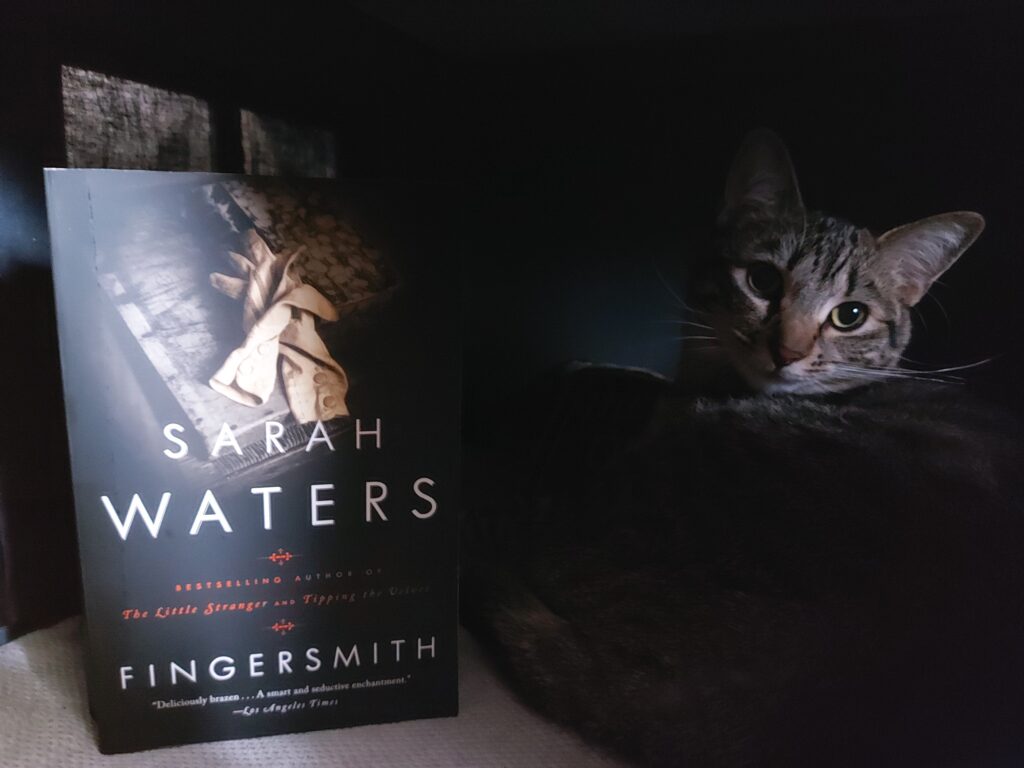Fingersmith by Sarah Waters

I have read a couple of Sarah Waters’ books prior to Fingersmith: The Little Stranger, which I ended up hating, and The Paying Guests, which I found interesting, but was not overly excited about. Usually at that point, I would give up on Sarah Waters, but Fingersmith is well reviewed, and it sounded like an interesting story, so I decided to give her novels one more chance. I am glad that I read Fingersmith. If you like Charles Dickens, or if you like historical crime fiction, then you will like Fingersmith as well.
Fingersmith is set in Victorian England and opens on seventeen-year-old Sue Trinder, who is a “fingersmith” (aka thief). Sue was raised in the slums of London by Mrs. Sucksby, who runs a “baby farm”, and lives with an assorted group of criminals. Sue does not know who her father is, and her mother was hanged for murder. Sue is not too bright, but she is loyal to Mrs. Sucksby. One day a con man that they know, Gentleman, shows up with a proposition for Sue: go work as a lady’s maid for a wealthy young heiress and help convince her to marry Gentleman so that he can get his hands on her fortune, and he will give Sue a portion of the fortune. Sue is reluctant to do this at first, not so much because of scruples, but because she is afraid to leave Mrs. Sucksby and her home in London. However, she wishes to repay Mrs. Sucksby for all the kindness that Mrs. Sucksby has shown her, and decides to go along with Gentleman’s plan.
Sue travels to Briar, which is the secluded country home of the heiress, Maud Lilly. Maud lives a sheltered life with her controlling uncle. Maud is quiet and reserved, and a bit strange, but as Sue gets to know Maud, she begins to fall in love with her, and she begins to feel conflicted about her part in Gentleman’s plan to swindle Maud out of her fortune.
Fingersmith is a richly detailed story of queer love, deception, and revealed secrets. There are quite a few twists in this novel; one of them was so surprising, it practically made my eyebrows jump up off my face. But the best part of this novel are the characters. Most of the supporting characters are one-dimensional, yet each is unique in their own way. The two main characters, though, Sue and Maud, are so fully developed that you will find yourself liking them despite their moral ambiguity and rooting for their relationship.
Fingersmith is also a commentary on society’s continued mistreatment of women. If you are as familiar with historical novels as I am, then you are probably already aware that it was standard practice for husbands and fathers to have their wives and daughters committed to lunatic asylums when they wanted to get them out of the way. These women were terribly abused and tortured by the matrons that worked at the asylums, instead of being shown compassion by members of their own sex.
I really enjoyed reading Fingersmith and thankfully it has a satisfying ending. It is one of those novels that I can see myself reading again and again.
One thought on “Fingersmith by Sarah Waters”